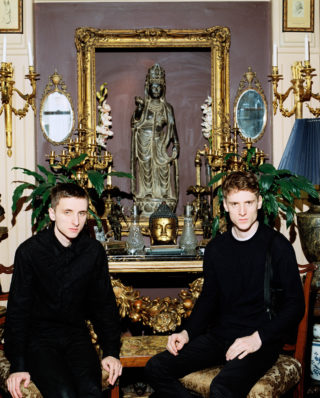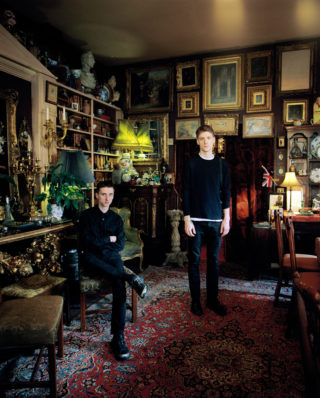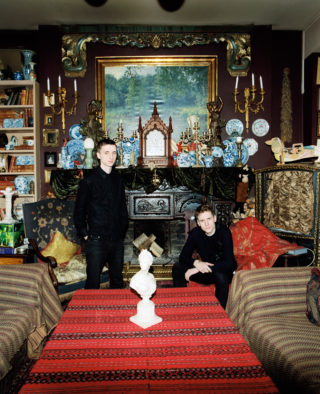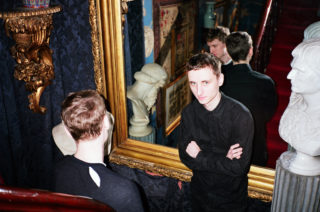Ok, Forget ‘Beat Pyramid’ – These New Puritans have already changed everyone’s minds with new album ‘Hidden’
Inside the Company

Inside the Company
Monday night, 25th of January, and Bush Hall is packed out with an expectant audience while the stage is crammed with samplers, a laptop, a rack of chains and a six-foot Taiko drum that dwarfs the drum kit. There is also a neat row of chairs with music stands in front of them that gradually fill with musicians bearing bassoons, tubas and the like. As the lights dim, the small brass and woodwind section play a brief, mournful intro, which is met with an awkward ripple of giggles from the darkened auditorium. This is, in fact, ‘Time Xone’, the opening track of These New Puritans’ new album, ‘Hidden’, though the audience are clearly expecting something more along the lines of savage, swarming chest thumper, ‘We Want War’. Fortunately, that’s the next track in line and the giggling dissolves into whoops, cheers and knowing head nods as a furious synthetic whir brings the band to the stage, pulling the classical instruments into context.
Bush Hall was the first night These New Puritans had played live with an orchestra and already they suspect it will be strange to play without it. “If we had the money, we’d play with them every time, but we don’t,” says drummer George, although hopefully the more shows they do without, the more funds they’ll have to put towards bringing the orchestra back (though probably not the enormous drum). It will be worth the effort; last night’s show was absolutely thrilling.
“Another show we did was in Berlin, it was the worst show we’ve ever played,” says Jack.
“It was just full of pilled up kids that weren’t really interested, they were just there to party,” adds George.
“It wasn’t just kids,” says Jack. “It was some kind of corporate event and, yeah, they were just there and we were just… there.” Apparently this dull pill party was not so much an album-plugging venture as it was a means of funding the classical musicians who eventually joined TNP at Bush Hall. Did it make the band nervous to perform with them for the first time? “Maybe a little bit,” says Jack. “All in all we had about five hours’ rehearsal with them, less than that.”
“I wasn’t at all nervous, really,” counters George, turning his face up at his brother. “They were such proficient musicians that there was no need to be nervous. They were just playing exactly what you’d composed. I think the worry’s more on your shoulders because there’s rests for x amount of bars that you…”
“That’s not difficult,” interrupt Jack. “I think that’s the least difficult bit.”
As for how subsequent gigs will work, minus the orchestra, as at TNP’s Rough Trade instore the week before, Sophie [Sleigh-Johnson] will play the brass and wind parts on her keyboard. “But it’s not just her,” says Jack. “We all have two ways of playing, one with the brass section and one without, we just have to adapt.”
“But we don’t play with brass sounds, we play with other sounds,” George adds, the idea being that using a laptop or synth to simulate having a small chunk of orchestra on stage is a bit rubbish and it’s more interesting to put together something different for the times when the real thing isn’t available.
“It was weird playing in the shop,” Jack comments. “We only played four or five songs because of the curfew.”
George: “It was really good though. There were six hundred people there and only three hundred could get in.”
Jack looks at him, a bit confused.
“Yeah,” George repeats, “There were three hundred people in the shop and more outside, it oversold!” It seems that Jack is more focused on the music than on crowd numbers or publicity. In fact, the press reaction to ‘Hidden’ seems to have both brothers a bit nonplussed – when discussing the album they appear to be rather underwhelmed by their own work.
Yeah, they’ve chatted to more than a few journos and glared gauntly at just as many cameras recently, but otherwise the Barnett brothers (who these days take care of all press matters as a duo, without Sophie or bassist-come-percussion hand Tom Hein) seem removed from the whole affair. When presented with the intended compliment that their new record is ‘a bit epic’, their mutual response is a vague, “Mmm, s’pose so,” which could set off a whole host of arrogance alarm bells, but there isn’t so much as a whiff of haughtiness coming from the Puritans side of the table, where George and Jack are respectively devouring and picking at their pub dinners, awaiting the next question.
And as far as my charmingly eloquent ‘epic’ comment is concerned, “I dunno, really,” contemplates Jack “I’ve lived with ‘Hidden’ for such a long time now, I’ve been writing it for about a year and that’s not such a long time but… I can hardly even hear it, I’m used to it.”
George agrees: “I can’t anymore. I remember really loving ‘We Want War’ when we first recorded it and now I don’t really care – I still think it’s good, I just don’t get the same buzz from it as I originally did. I want the next single we recorded to be out now.”
Next single? The dust is still settling in the venue from last night’s live album unveiling and we’re already on to the next thing. It shouldn’t be that surprising since ‘Hidden’ was already in the works even as the band’s debut LP was being released and no sooner has LP number two hit the shelves than the next single is on the way. And it doesn’t sound like it will be fruit fallen from the same tree that bore the likes of ‘We Want War’.
“We’re going to get a prepubescent girl to sing while me and you play music,” explains George, gesturing to Jack. Turning back to me – “We need to find someone who sings… a bit like Joe le Taxi.”
“Or maybe like the Svengalis,” adds Jack.
With such overactive creativity glands, ideas buzzing round their heads like wasps, it’s a wonder these two can sit still long enough to have this conversation.
“It’s a really amazing song,” George continues. “It sounds really poppy, but not because we’ve made it poppy, just because that’s what you’d written. It sounds really good, I like it, and the fact that you heard it in a dream,” [a peculiar look from the L&Q side of the table], “like Pocahontas,” he offers [peculiar looks from both sides of the table]. “Pocahontas saw things in dreams…” George trails off.
“It was an imaginary pop singer,” explains Jack “just playing this song and it sounded good so I woke up and sang it into my Dictaphone. It’s kind of annoying because it was just too late, we’d just finished recording ‘Hidden’ when I wrote it and I didn’t get to finish it off properly.”


Certainly looking like brothers but not necessarily the twins that they indeed are, it’s Jack who cut the shape of an introverted genius. It’s Jack who’s shy-to-awkward, often looking down or away, and it’s Jack who’s the band’s creative force and skilled writer.
“It’s not like I’m not doing anything,” defends George. “It’s like, without me I think the band would sound completely different.”
“Yeah,” Jack agrees “but it’s not like a band, it’s more like a company or something.”
“But it’s me and you, basically, doing stuff…” says George. “I’m more of an editor, Jack is the genius behind the group,” he states matter-of-factly, consulting Jack over the word ‘group’ as opposed to ‘company’, even as Jack is calmly returning the genius comment. “I’m learning to play the violin,” George adds.
But if Jack is ultimately the company’s leader, its director, why isn’t he doing the snaps and chats on his own, or, if These New Puritans is more of a group, why aren’t Thomas and Sophie along for the press rounds?
“It’s our band, it’s our group, really… It’s so unfair!” George laughs.
“I could just stand here and say it’s mine, couldn’t I,” observes Jack.
“I could just stand here and say it’s mine,” retaliates George. “Well, no, I couldn’t. I mean, there’s a difference between me and you being brothers and doing absolutely everything and the other two, they play music with us and that’s our band, we play music together.”
“We do the day-to-day running, the business side of things,” Jack clarifies.
Business aspect aside, the guys say they have been playing music together since they were seven years old and Jack has recorded since about that age as well, using their older brother’s four track recorder and borrowing George’s drum set to create beats. George happens to have a track on his phone and gives us a listen. “The group name is George and Jack,” he announces (their genius hadn’t extended to imaginative band names yet). The track isn’t exactly the stuff of ‘Beat Pyramid’, let alone ‘Hidden’, it’s all spaced out chords, wiry guitar slices and Casio bleeps, based around a simple beat. It’s the sound of young musicians learning about building tracks, fitting layers together to create a whole, somewhere between construction and backwards dissection – a crash course in production.
These New Puritans’ music is constantly, rapidly evolving and, as well as becoming tighter and more sophisticated, demonstrating a great deal of restlessness, ambition and a virtually unquenchable flow of ideas. Early ventures such as the track on George’s phone gave way to 2006 EP, ‘Now Pluvial’, a whirlwind affair recorded in one session straight to Jack’s laptop. It was a vicious, paranoid gauntlet, thrown down by TNP, not so much to other groups as to themselves. This was followed in 2007 by the Dior Homme-commissioned track ‘Navigate, Navigate’, clocking in just under the thirteen-minute mark, which retained the precisely haphazard energy of previous work but had begun to explore the relationship between beats, melodies and vocals – and the empty space between those elements, which resulted in moments of sonic clutter and strangely intriguing pockets of stark, itchy percussion. By the time debut album ‘Beat Pyramid’ stormed into the world in 2008, These New Puritans had already earned a reputation for themselves, standing apart from other artists of the Southend scene, referencing a jumble of influences from The Fall to Wu-Tang Clan and being branded with genres including post punk, new rave and art rock. Their debut confirmed that this group was a force to be reckoned with, and not just on the writing and playing front, the production was improving, developing into a style that encompasses levels of organised chaos and layers slick with grit, like ice beneath scattered shards of glass and earth. The release of ‘Hidden’ introduces further challenges including samples of sharpening knives, sculls being smashed (the classic radio technique of melon meets hammer), a children’s choir and yet another crash course, this time in orchestration and arrangement for a brass section. At this point it’s a tough call to say whether Jack is more of a musician or a producer.
“I’m not really any of those things,” he says, a bit flustered. “I’m kind of a musician but I’m not really a musician, kind of a producer…”
“A composer,” suggests George.
“Kind of a composer, but not really because I’ve not really composed that much music,” Jack considers. “I’m more of a beat maker but it’s not really beat-making music.”
“I think that you should – that we should – write for musical films,” George intervenes, eliciting a non-verbal, none-too-convinced question mark from his brother. “Yeah, that’s what I’d really like to do.” This slight curve ball lands and rolls round the table for a moment before Jack picks it up, pointing out that the trouble with that is that one would be expected to work to other people’s ideas of what the music should be like, and even five minutes in his company is enough to know that that is not the way Jack Barnett goes about creating his tracks. That (rather crucial) point aside, ‘Hidden’ almost certainly has a story line to it, including a prologue and an epilogue. It’s a sort of musical film score without the film aspect. There’s something almost operatic about it, maybe a whiff of Wagner – “You don’t like Wagner do you?” observes George, glancing at Jack. “He’s not really my thing,” Jack responds, flatly.
One could furiously backpedal, perhaps mumbling something pathetically apologetic about any unintentional Nazi implications or, more likely, the suggestion of a stuffiness or pomposity about the music, but being compared to Wagner, regardless of whether he’s on your Spotify playlist or not, is a testament to the sheer strength and impact of the composition. The beginning/middle/end layout of the record is undeniable and, though the ‘epic’ comment didn’t go down so well either, ‘Hidden’ is a substantial piece of work, with bursts of euphoria, an overall aura of mysticism, darkness and bold lashings of violence. The production is so heady and complex, it’s no wonder the album took over a year to put together.
“We were talking about this the other night,” says George. “Recording in the studio took a total of about three weeks, which is nothing really. It was so well-written before hand, we had scores for every song and recording the brass and woodwind took less than one day – six hours, in and out, three hours for woodwind, three hours for brass.”
“So literally half the album was done in that time,” adds Jack, “Which is a massive risk, there are lots of massive risks on this album.” The particular risk in the case of the brass and woodwind recording was that something could have gone wrong and the band wouldn’t have been able to afford to get the classical musicians in again for another session. Another massive risk, says Jack, was getting Dave Cooley to mix the album. “He doesn’t do this kind of music, really,” says Jack. “What I think he’s best at mixing is hip hop, which has a maximum of two components, beat and voice, this record has something more like three-hundred components.”
“Well, it did take about ten days to mix ‘We Want War’,” George points out, bearing in mind that it would usually take a day or so per track. This inspired a brief spell of panic at the start of the mixing process, when it occurred to them that it could take the same time for all eleven songs. Fortunately, this was not the case and the brothers say the rest of the album flew by after that.
Being in a band with such expensive concepts and high risks can be quite complicated as it demands a lot of time and attention but also a significant amount of cash, which is tough to come by if the music is consuming time which could be used for other work.
“These New Puritans is my work,” Jack states. “George is a chauffer.”
“The money I make goes back into the band,” says George. “Like, the video, for example. And I like to meet people, get ideas…”
“You’re the fixer,” Jack grins. “He’s the fixer of the band and my contact in the outside world.”
“Yeah, I control your circle,” laughs George. “I’m not letting anyone in.”
An image springs to mind of a pallid Jack, huddled in a small, dim room, surrounded by samplers and a few dozen four tracks while George stands guard, inspecting proffered gifts and offerings from a queue of devotees, turning away anyone who seems unfit for an audience with the reclusive genius. Surely Jack has more on his agenda than devising the next TNP creation?
“Yeah, but it’s what I like doing,” he says. “It’s my idea of fun.” Plus, there’s the issue of control, or at least creative input, the old ‘If You Want Something Done Properly’ thing. This strikes a chord with both brothers, who admit that not having things run past them, even the minutest detail on a flyer, for example, can grate on them a bit. Again, this is not so much band ego as it is frustration with the state of the music business; the tabloid culture, bribery, what ever it is that gets mediocre clone-of-a-clone guitar bands how ever much funding and fussing they need to do what ever it is they seem to think they’re doing. As Jack puts it, “Really crap bands that people think are doing amazing things, like using an arpeggio synth for a song, playing really boring rock’n’roll and being styled by some twat so they get attention.” Anyone remember a one J Barnett sporting a rather fashion forward Romanesque tunic of gold leaves a year or two ago? Never mind.
“Those bands can be so conservative as well,” George observes. “In fact, I was thinking that, about the classical musicians we were working with, that people tend to think of the classical world as being much more conservative, but I don’t think it is. I think even the people in the classical world are likely to be much more interesting.”
“More interesting than people who play guitars,” comments Jack. “It’s a very conservative world, the guitar world.”

Obviously one could bitch and moan about the industry for ages, though, as George points out, it wouldn’t be worth the breath. “I hope people hate us as well,” he reflects. “I hope there’s a real hatred as well as a really positive side, I don’t like middle ground.”
Oh, come on, there’s always someone who hates your band…
“Well, yeah, like in Italy or Spain, the people who just like dance floor hits,”
Jack: “People who just listen to singles.”
“Yeah, or people in places, like Italy, that are about ten years behind with music,” says George, even as he realises he has no idea what people in Italy, or Spain for that matter, think of These New Puritans’ current work. But what about their fans? There has to be a group of seriously put out TNP followers who think the new album is a load of crap, or, at least, preferred the more accessible material on ‘Beat Pyramid’. Both boys look shocked; they think ‘Hidden’ is far more accessible than its predecessor.
“I think it’s more accessible in that it’s more open, it’s more emotional and has a lot more range musically,” Jack says “and also a lot of the music we listen to is more accessible music.”
George: “Madonna.”
Jack: “Yeah, and well-produced R’n’B, stuff like that.”
The general consensus is that they think more people will like ‘Hidden’, though, says Jack, “Only time will tell.”
“It’s weird that we’ve got two albums,” he says, somewhat in awe.
“I was thinking about that the other night,” says George “and how now we’ll need to make another one.”
“Of course we’ll make another one,” Jack exclaims. “We’ve got so much music that’s not even released, at least double that amount.”
George suggests that they start releasing a song at a time, not singles, just songs, so people know where These New Puritans are at exactly that point. Jack agrees that the album will eventually become extinct and reckons releasing a track every couple of weeks or so would work. Well, it would work for a band like his, anyway. “We’re really into writing music,” he says “we’re not really that bothered about ‘acting like a band’. It’s not a band thing, it’s a music thing.”
That’s one thing in particular that they enjoyed about the Bush Hall gig, it wasn’t all lasers and smoke machines, it was playing their music in its full capacity, to an audience who enjoyed hearing it. I tell them about the classical music giggles at the start of the show and they both chuckle, they think that’s brilliant. Nothing like shifting people out of their comfort zone, eh? To that point, there is a book, released before ‘Hidden’, which contains the score, so technically there were many people who got to ‘hear’ the album before hearing it. The first edition has sold out and they think the second edition will include an extra piece of music that isn’t on the album, a piece of music that would be in paper form only, no recorded track. Very cool, if a bit unfair to those of us who don’t know the first thing about sheet music – just because Jack learned notation in roughly a month doesn’t mean everyone can. George starts laughing. “There was a funny moment with the orchestra the other day…”
Jack: “Section! It’s not a fucking orchestra, it’s a section.”
George: “Section, okay, but it was just funny the way they were using this jargon with you as if you used it all the time, and you did know it but they must have assumed you’d written music for more than just a couple if months… all that terminology, it was hilarious.”
Almost as hilarious as opening your gig with a piece for brass and woodwind, or running round measuring doors in order to get a six-foot drum on stage. Lengthy album tour and book with ‘hidden’ track aside, who knows what These New Puritans are going to come out with next? Well, they probably know, but it’s unlikely anyone else could even begin to hazard a guess.